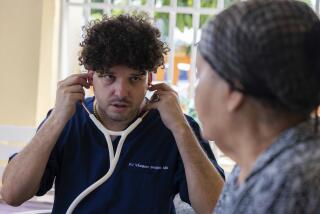Health Center Practices Justice by Practicing Medicine
- Share via
By mid-morning one day last week, it was standing room only at the San Pedro Family Health Center in South-Central Los Angeles. Mothers and children, a few young couples with their babies, a girl filling out a form and an old man on crutches had occupied the chairs, and several people stood among the children playing on the waiting room floor.
It is a plain, pleasant little room with an eclectic assortment of things to look at on the walls--Van Gogh’s sunflowers; the Hippocratic oath; information on glasses, immunizations and child abuse printed in Spanish, and the familiar yellow-and-black Civil Defense logo with a distinctly non-government-issue message: “There Is No Shelter From Nuclear War”--eclectic but not accidental in a center where founders and directors Ann Turner and Catherine Bax believe that practicing medicine and administering health care are a means of practicing justice.
Inside, behind the closed door of one of the consulting rooms off the long corridor, Turner was having a long visit with aa gray-haired woman, devotional book in hand, who was talking about the current state of her husband’s alcoholism, her progress in raising her grandchild now that the daughter was incapable of doing so, the gang problem in her neighborhood. . . .
They talked quietly for a while, then Turner handed her patient a hospital gown and left the room for a minute while the woman undressed for an exam. She is menopausal, Turner said, and has begun taking hormone replacements.
“We’re trying to get (menopausal women) to take hormones and calcium to protect their bones,” Turner said. “It’s a real process, explaining and weighing the degree of cervical cancer risk versus the risk of a broken hip, trying to get them involved in the decision. . . .”
Down the hall, Catherine Bax was talking with a young couple who had come in with their two little boys. The whole family had come for the occasion of the very chubby 2-year-old’s diphtheria-pertussis-tetanus booster shot. Bax chatted with the family in Spanish, asking what the child ate and how much milk he drank in the bottle he had not yet given up, and joked a little that he had outgrown standard-size disposable diapers and maybe could be giving them up entirely. They were working on that, the parents told her.
Tears and howls from the 2-year-old when the needle hit, clucking apologies from Bax, gentle cooing and chuckling from the parents and blissful abandon from the 4-year-old running the wooden truck around the floor. Before the family left, Bax urged them to watch the little boy’s weight, to hold back on the snacks and fats. She’d see them in a few months.
Technically, they are Ann Turner MD, a graduate of USC’s School of Medicine, with advanced degrees from Johns Hopkins and the University of Utah, an internist with a sub-specialty in hematology, and Catherine Bax RN, a family nurse practitioner who earned her credentials at UC Davis. To their patients, Turner and Bax are las doctoras.
The patients who come to the center at 4524 San Pedro Place are mainly Latino, often immigrants, probably undocumented, usually poor, they said. They treat them on a sliding-scale basis, fees being determined by ability to pay. The full fee for an office visit is $32. From there the scale slides down to $8, and that is where 90% of the patients fall. Follow-up visits for ailments are usually covered by the initial fee. The medicines stocked in the health center’s pharmacy (which fills only the center’s prescriptions) and any lab work done on the premises are provided at-cost to the patient.
Bax draws a salary of $700 a month; Turner, $1,000. It is not her higher status as a doctor that accounts for Turner’s higher salary: “I own the building and have to pick up the property taxes, et cetera. So it costs me more to live.”
Neither woman seems to spend much time figuring up how much money she could be making. When pressed, Turner was vague but guessed that a salaried doctor with her specialty might earn a minimum of $70,000 per year and that a nurse practitioner probably would get $25,000 to $30,000.
Clearly they are not in this for the money.
What they are in it for seems to go without saying. Only when asked outright do they explain themselves. Turner is an admittedly shy woman who is uncomfortable turning a conversation on herself; Bax is more at ease but offhand about something that has been so matter-of-course in her life for so long. It just seems so obvious.
Long ago Turner, deeply troubled by the overwhelming poverty she was seeing and the inequities that existed between rich and poor, decided that for her “practicing medicine was just a way of practicing justice.” She still sees it that way, she said.
Bax said she agrees “even more strongly now than before. It just doesn’t seem right that I should live with all the material things I could have when other people like our patients are living the way they are. . . . When you spend all your energy trying to acquire things for yourself, you become dependent on that instead of what real values are--you know, trying to create the kind of world we want and help people to live better lives.”
Frequent Ailments
What is more interesting to them is to explain what they are about at San Pedro. Taking a few moments between patients, Bax interrupted her own running commentary on the most frequent medical problems they see--hypertension, diabetes, depression, obesity, gynecological problems, ear infections in the children--to sum up their philosophy.
The people they serve could go to the county hospitals and clinics where an “ability to pay” policy is in effect, Bax said. Not all are aware of it or informed of it, she said, and end up paying $30 per visit. Transportation, long waits, a bureaucratic maze and a confusing number of medical professionals, often with little continuity, all tend to dissuade people from using the facilities.
“Pretty much the bottom line for us is that we want to provide the kind of health care for these patients that we would want for ourselves or that people in more affluent areas would want. That does not necessarily mean high-tech. We take time to know the patient and explain as best we can what’s going on,” she said. “We want them to know we’re going to see them, that it’s not going to cost a lot, that we’re not going to send them for bunches of tests. We want them to feel they can come and find us here, that the staff won’t be constantly changing, that we’re going to take care of them.”
A Naive Beginning
They have been doing that for four years. Earlier that morning, before the first patients were admitted, Turner sat in the lunch room, a place she seldom gets to at midday, and described how they got started. They began rather naively, she said she now sees. They had met each other through the L.A. Catholic Worker. Bax was a member of that community; Turner, a volunteer at the community’s free clinic. Both are single and in their 30s.
“We felt if we took the profit out of medical care people could probably afford it. We opened on an ‘at-cost’ basis. Later on we found they can’t afford that either,” she said, explaining their fee scale and the fact that cutbacks in Medi-Cal coverage several years ago have resulted, she believes, in some people going without medical care of any kind.
“We decided we’d better become nonprofit and try to get some money to help expand our services.”
When they became nonprofit last year, they had grown by word of mouth from four or five patients a day to the point they are at now--about 40 patients a day. With current staffing (there are a receptionist, administrative assistant and several medical assistants who do intake and preliminary procedures), they are overwhelmed, they said, and can accept no new families.
They have put a board of directors together, sent out a brochure, received $9,000 in private contributions and begun to connect with medical specialists who will accept referrals or volunteer their services at the center.
They are looking for more specialists, they said, and they are about to look for more funds. They would like to hire several nurse practitioners or doctors, people who share their commitment to the poor, although if funds permit, they have no objection to paying regular salaries.
More than anything, they want to remain the old-fashioned family practice that they are.
“There’s just something about having your own doctor that gives people a sense of security. Just having health care available has its effect on health,” Turner said.
More to Read
Sign up for Essential California
The most important California stories and recommendations in your inbox every morning.
You may occasionally receive promotional content from the Los Angeles Times.










